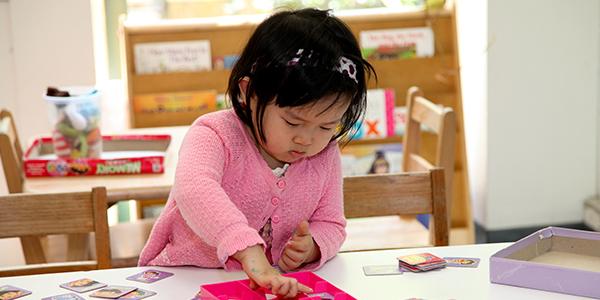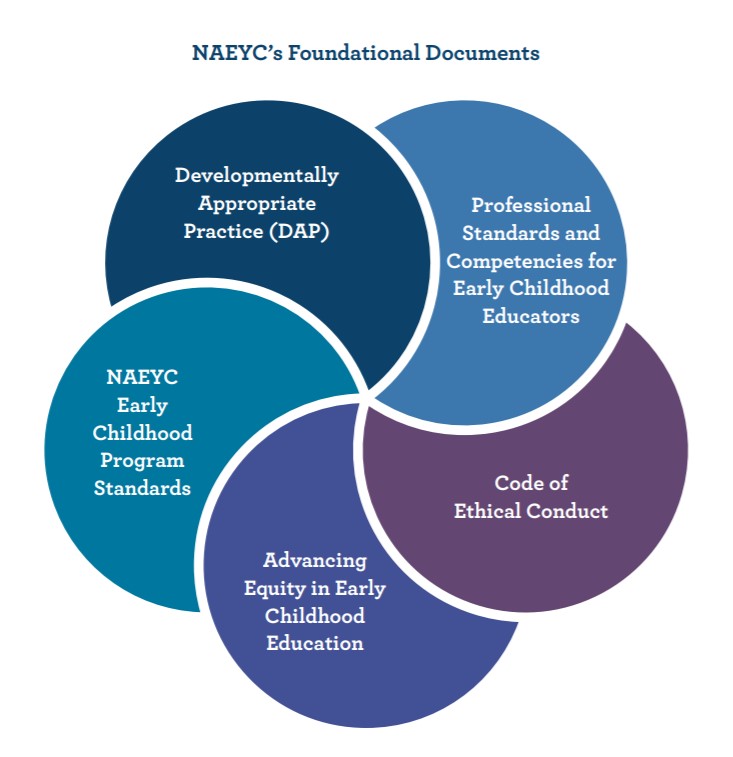DAP: Purpose

You are here
Chief among the professional responsibilities of early childhood educators is the responsibility to plan and implement intentional, developmentally appropriate learning experiences that promote the social and emotional development, physical development and health, cognitive development, and general learning competencies of each child served.1 But what does it mean to be “developmentally appropriate”? This position statement, one of five foundational documents developed by NAEYC in collaboration with the early childhood profession to advance high-quality early learning for all young children, defines the term. The definition emerges from a set of evidence-based core considerations and principles of child development and learning, all of which are explained in the principles section of this statement. To support educators’ use of developmentally appropriate practice, this statement also identifies guidelines for decision making in six key areas of responsibility that correspond to the Professional Standards and Competencies for Early Childhood Educators.2

This statement’s primary focus is on the decisions early childhood educators make that result in developmentally appropriate practice. It is important to note, however, that educators make these decisions within settings that include their specific programs as well as broader systems, states, and societal contexts. Decision making that advances developmentally appropriate practice is facilitated when these systems also reflect the tenets described within this statement. Therefore, in addition to identifying guidelines for early childhood educators, the statement makes specific recommendations for policies and actions needed to support educators as they strive to implement developmentally appropriate practice—in their work settings, through professional preparation and development, in public policy, and through continuing research.
This is the fourth edition of NAEYC’s position statement on developmentally appropriate practice. (For a brief history and summary of changes from previous editions, see Appendix A.) More extensively than in previous editions, the definition, core considerations, principles, guidelines, and recommendations all underscore the importance of social, cultural, and historical contexts. This broader view emphasizes the implications of contexts not only for each child, but also for all the adults (educators, administrators, and others) involved in any aspect of early childhood education.
We begin this statement noting multiple tensions:
- This position statement is based on a synthesis of current research and evidence across multiple disciplines. Although research finds that culture and context matter, relatively little research has been conducted with children from non-White and non-middle-class backgrounds. There is also a need for additional research led by those who reflect the diversity of children and families and their lived experiences.
- This position statement requires well-prepared and qualified early childhood educators to engage in effective decision making. Yet insufficient funding and other policy decisions (for example, budget-driven decisions related to group size and ratios or mandated curricula and assessments that do not reflect the principles of development and learning identified here) have resulted in suboptimal environments, challenging working conditions, and inadequate compensation that make it difficult for early childhood educators to implement these guidelines.
- This position statement elevates the crucial support educators require from higher education and other professional development systems. Yet even as they grapple with their own institutional biases and inequities, professional preparation programs and ongoing professional development systems must orient themselves towards consistently and effectively preparing and supporting educators to reflect on and address their own inherent biases and to help them provide developmentally, culturally, and linguistically responsive learning experiences to an increasingly diverse population of children.
- This position statement highlights the importance of learning experiences that are meaningful to each child and that provide active engagement through play, exploration, and inquiry in ways that support the whole child—socially, emotionally, physically, and cognitively. Yet such opportunities are too often denied to young children when educational practices are not responsive to their developmental, cultural, and linguistic characteristics.
- This position statement is based on NAEYC’s core values and beliefs, which underscore the fundamental right of each and every child to live in a society dedicated to helping them achieve their full potential. Yet the historical and current inequitable distribution of societal power and privilege on the basis of race, ethnicity, gender, language, disability, and other social identities results in limited opportunities and harms children—as well as early childhood professionals.3
Each of these tensions must be addressed for each child to achieve their full potential. We offer this statement as a call to action, committing to work collectively to address the ways in which current realities constrain the full potential of all young children as we continue to reflect and learn from multiple, diverse perspectives.